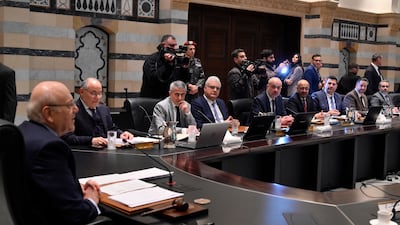The decision of Lebanon’s cabinet on Friday to dismiss two French lawyers appointed to defend the country's interests in central bank governor Riad Salameh’s corruption case has been labelled “scandalous and pathetic”.
Emmanuel Daoud and Pascal Beauvais were chosen in March by Helene Iskandar, the president of the Cases Authority at the Ministry of Justice.
The cabinet accused Mr Daoud of defending “Zionist ideas”.
“The cabinet's decision regarding the French lawyers, especially Emmanuel Daoud, is a scandalous and pathetic attempt to obstruct justice,” former justice minister Marie Claude Najm told The National.
The two lawyers offered pro bono services and signed contracts with Minister of Justice Henri Khoury in early April. They were submitted to the Council of Ministers for approval.
The Lebanese cabinet refused citing Mr Daoud's membership of the International League Against Racism and Anti-Semitism, or Licra.
Licra “is suspected of advocating Zionist ideas”, it said.
The cabinet's decision, seen by The National, also said French lawyer Antoine Ory was in “close contact” with William Bourdon, the lawyer representing the civil party in the case in France. This “raised suspicions about the impartiality of the proposed choices”, it said.

Mr Ory was on the list of potential lawyers but was not appointed by Ms Iskandar. The reason why his name was mentioned is unclear.
Mr Daoud is a renowned defence attorney in Paris known for his expertise in international criminal law and human rights. He has defended several high-profile cases both in France and internationally
His dismissal sparked immediate controversy.
Mr Khoury, absent from the cabinet session amid a boycott by some political parties who view them as unconstitutional, said he will hold a press conference on Tuesday.
He said he will “expose the truth, supported by documents … regarding the appointment of French lawyers to recover Lebanese state funds”, and as to why the lawyers were dismissed.
Caretaker Prime Minister Mr Najib Mikati said on Monday he intends to hold an “urgent meeting with a single agenda item” on the appointment of new French lawyers.
He invited Mr Khoury to attend the session, scheduled for Wednesday.
Karim Daher, lawyer and founder of the Lebanese Association for Taxpayers' Rights and Interests (Aldic) said the allegations of Zionism were being used as a pretext.
Global consulting firm Kroll, which was entrusted with a forensic audit of Lebanon's central bank in 2020, was dismissed under similar allegations, Mr Daher said.
The real motive behind the decision was to obstruct the Lebanese state from defending its interests, he said.
“If Lebanon becomes a civil party in the case, it would have access to the files in France, which could potentially uncover more evidence for new investigations in Lebanon or implicate additional individuals in the existing case,” he said.
“The ruling class wants to avoid the leak of information that could compromise them and lead to further legal proceedings.
“They also don't want to set an example of accountability by seizing misappropriated assets. If they were to do it for Mr Salameh, it would imply that they should do the same for the entire ruling class.”
Mr Daher said that it was not the first time a procedure to recover ill-gotten assets has been blocked.
In 2021, Aldic provided legal advice from a Swiss law firm on how Lebanon could recover illicitly acquired assets invested in Switzerland, in case of trial.
The document was received by Ms Najem and forwarded to former prime minister Hassan Diab.
It was never included on the agenda of the Council of Ministers.
European countries including France, Switzerland, Germany, Luxembourg, Belgium and Lichtenstein suspect Mr Salameh of having embezzled more than $330 million from the central bank through his brother's company, Forry Associates.
Both France and Germany have issued an arrest warrant for Mr Salameh.
They allege that Forry, which received a 0.38 per cent commission from Lebanese lenders on each transaction with the central bank for more than a decade, is a shell company which did not perform any services in return.
Mr Salameh is suspected of buying luxury properties in Europe with the Forry commissions.
In the event of a conviction, these properties would be confiscated and sold, as the state of Lebanon would be considered an injured party. But Lebanon cannot automatically reclaim the funds – it would need to first establish its right.
The appointment of lawyers in the French probe was an initial step towards achieving that goal.










